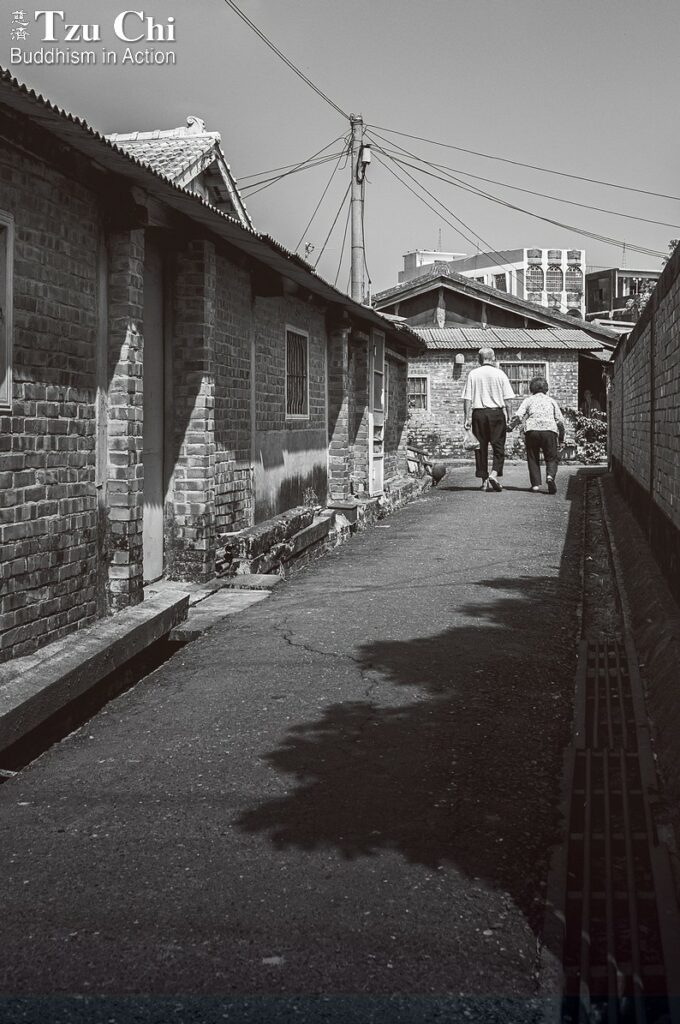Lost and Found
By Yi Yi (懿旖)
Abridged and translated by Wu Hsiao-ting (吳曉婷)
Photo by Huang Xiao-zhe (黃筱哲)
Lost and Found
By Yi Yi (懿旖)
Abridged and translated by Wu Hsiao-ting (吳曉婷)
Photo by Huang Xiao-zhe (黃筱哲)

In an aging society, it's crucial to strengthen our network of care to better support the elderly.
Recently, Tzu Chi's Da Ai TV aired the second season of Still Me, a drama inspired by true stories about dementia. Its popularity highlights the growing concern over dementia in Taiwan, where the elderly population is rapidly increasing.
According to Taiwan's Ministry of Health and Welfare, approximately 350,000 people aged 65 and older are living with dementia. My father is one of them. While he initially managed mild memory loss well, the turning point was the COVID-19 pandemic. His greatest joy was singing karaoke with friends; his eyes would light up at the mention of it, and he would proudly tell us how many songs he could sing.
Unfortunately, social distancing measures during the pandemic led to the closure of karaoke venues. With limited social interaction and being stuck at home watching TV all day, my father's memory began to decline more rapidly.
One autumn afternoon, after days of rain, he took his bicycle out and got lost. Hours passed without any sign of him, and as it grew dark and more rain began to fall, our anxiety escalated. With his phone likely dead, we couldn't track him. We reported him missing to the police and enlisted the Taiwan Alzheimer's Disease Association to post a missing person flyer online. We drove around and around searching for him, but he was nowhere to be found.
We experienced the fear and anxiety that every family of a dementia patient dreads. The wait was agonizing—I don't know how many tears I cried, and I struggled to eat or sleep.
During this distressing time, I was reminded of a childhood experience when I got lost. A kind woman found me and called my father to pick me up. I felt scared and alone, crying until I finally saw him in the golden light of the setting sun, riding toward me on his bicycle. In his comforting presence, my fears and tears melted away. The memory was still warm and reassuring, even after all the years. Now, in my distress, I prayed to Guan Yin, the Bodhisattva of Compassion, that someone would help guide him back to us.
Nearly 32 hours later, we finally received good news—the police had found him! A passerby, seeing him, sensed something was wrong and gently coaxed him to a nearby police station, where he waited for us to pick him up.
I can only imagine what my father experienced during those 32 hours. He hadn't spent any of the money he had with him, suggesting he may have gone without food or water. He likely hadn't slept either. Security footage showed that on the first evening, he had asked a shopkeeper for directions, indicating that at that point, he still knew he was lost. By the time we found him the next night, he had lost awareness of his situation and didn't even realize we had been frantically searching for him. After hours in the rain, he was dehydrated, shaky, and clearly frightened.
A family effort
Once home, my father rested for two days, and his cognitive abilities and energy gradually improved. To prevent a reoccurrence of such a frightening situation, our family took proactive measures. We implemented multiple tracking methods and made other important adjustments, including changes to his diet.
My father has always loved eating bread, but research suggests that excessive consumption of refined carbohydrates, like bread and pasta, can adversely affect glucose and insulin metabolism. This can impact blood vessels in the brain and can contribute to the buildup of beta-amyloid plaques, which are believed to play a key role in the development of Alzheimer's disease.
To promote brain health, we introduced brain-boosting foods into my father's diet, including nuts, pumpkins, tomatoes, dark chocolate, and black coffee. We incorporated vitamins and aromatherapy with essential oils into his daily routine, while cutting back on processed foods.
Once the pandemic eased, my father started walking an hour or more every morning. In the evenings, we engaged him in various activities, including calligraphy, finger exercises, and singing along to songs on the computer. We provided plenty of encouragement and praise during these activities.
We also started taking advantage of government elderly care services and arranged for a caregiver to visit my father for one to two hours each weekday. This caregiver engages him in conversation and cognitive activities, like playing chess. Thanks to these efforts, my father has not only maintained but even improved his cognitive abilities.
In our aging society, creating a close-knit support network for the elderly is crucial. Taiwan's government provides a broad range of elderly care services, while Tzu Chi has established long-term care service stations in various communities. These venues offer seniors vibrant learning environments where they can stimulate their minds, interact with others, and enjoy their later years. Many seniors have experienced improved memory and moods through these programs.
Ensuring that aging occurs with dignity and quality of life is a challenge every society must address. The COVID-19 pandemic highlighted the essential need for love, care, and meaningful interaction in our relationships. May we support our elders with warmth and may every person with dementia spend their remaining years in safety and love.
Contact Us | Plan a Visit | Donate
8 Lide Road, Beitou 11259, Taipei, Taiwan
886-2-2898-9999
005741@daaitv.com
©Tzu Chi Culture and Communication Foundation
All rights reserved.
